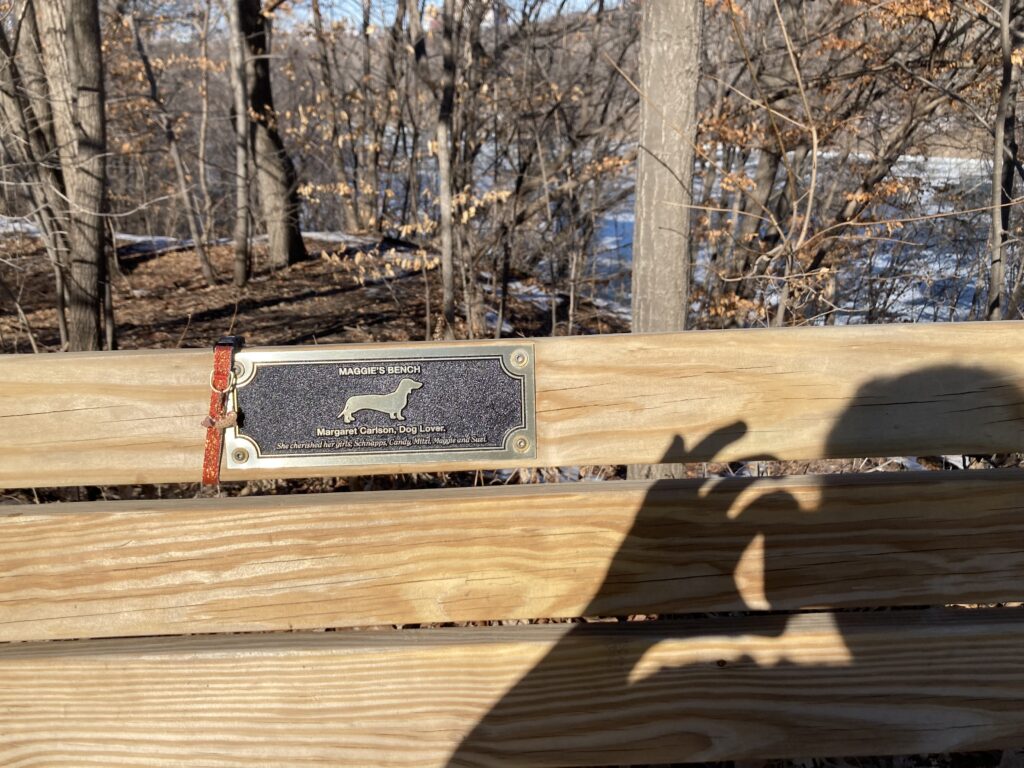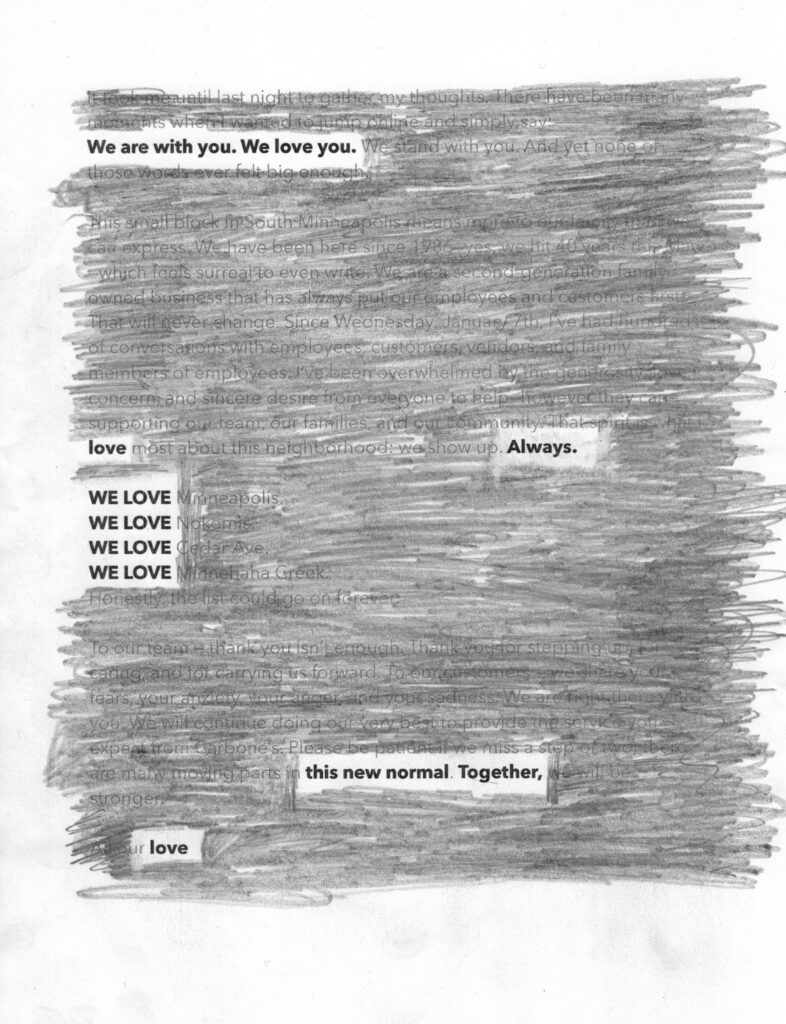4.5 miles
minnehaha falls and back
39 degrees
40% sloppy (snow/ice/puddles)
Ran in the afternoon, which is when I run most days this winter. It felt much better than yesterday. I think the effects of the second shingles shot are lessening. And I was less worried about blood pressure and heart rate too; both have gone down — not quite to normal numbers, but much closer than a few days ago.
It was sloppy out there! The snow and ice weren’t slippery — thanks Minneapolis Parks Department for sprinkling dirt on the trail! — but they were wet, and there were deep puddles in several spots. I managed to avoid completely soaking my shoes or socks.
Today it is gray and a dingy white — writing that, I’m thinking of a line from a Diane Seuss poem; I’ll find it after I finish this recounting of my run*. Gloomy, humid, wet. I didn’t mind. It felt more like early spring than deep into winter. Right after going outside, I even smelled thawing earth! There were some runners and walkers and bikers on the trail, but no cross country skiers or eliptigos or hoverboards. (Earlier today, when Scott and I were heading back from a meeting, we saw someone speed by on a hoverboard!)
The falls and the creek were frozen and everything was still. No one else around, which was a little unsettling. A few minutes later, heading out of the park, I heard some kids at the playground. Earlier, as I passed the parking lot, I heard the train bells and horn blaring. Was it a normal alert that the train was crossing an intersection, or a different warning?
I don’t recall hearing any birds or seeing any squirrels. No wild turkeys or yipping dogs. No bad music blasting out of a car window. Passing a trash can at 42nd, my nose crinkled as it got a faint smell of poop. My first thought: a diaper, but more likely dog poop. Yuck!
Near the end of my run, I decided to recite — again, out loud! — Alice Oswald’s “The Story of Falling.” It helped distract me, or focus me, or moved my mind somewhere other than how much more I had to run. I think it’s time to return to reciting poems on the trail! Maybe I’ll start with my Emily Dickinson experiment: pick a different ED poem to recite for each mile run.
*Here’s the Diane Seuss poem. It’s so good, and not too long, so I’ll post the whole thing again. I first posted it on 1 june 2024, when I was reading Seuss’ Pultizer Prize winning, Frank.
Legacy/ Diane Seuss
I think of the old pipes,
how everything white
in my house is rust-stained,
and the gray-snouted
raccoon who insists on using
my attic as his pee pad,
and certain
sadnesses losing their edges,
their sheen, their fur
chalk-colored, look
at that mound of laundry,
that pile of pelts peeled away
from the animal, and poems,
skinned free of poets,
like the favorite shoes of that dead
girl now wandering the streets
with someone else’s feet in them.
white as rust-stained, certain sadnesses as dull, soft, and chalk-colored
Get Out Ice
This morning, I watched Bad Bunny’s Super Bowl performance. Wow! So much love. Such a powerfully layered f–k you to hate! So many beautiful stories of a culture!
Here’s what was written about it on Facebook:
I watched Bad Bunny deliver the most American halftime show I have ever seen. Then I came home and watched it again. And I am not okay. In the best possible way.
He sang every single word in Spanish. Every. Single. Word. He danced through sugarcane fields built on a football field in California while the President of the United States sat somewhere calling it “disgusting.” Lady Gaga came out and did the salsa. Ricky Martin lit up the night. A couple got married on the field. He handed his Grammy, the one he won eight days ago for Album of the Year, to a little boy who looked up at him the way every child looks up when they dare to believe the world has a place for them.
And then this man, this son of a truck driver and a schoolteacher from Vega Baja, Puerto Rico, stood on the biggest stage on the planet and said “God bless America.”And then he started naming them.
Chile. Argentina. Uruguay. Paraguay. Bolivia. Peru. Ecuador. Brazil. Colombia. Venezuela. Panama. Costa Rica. Nicaragua. Honduras. El Salvador. Guatemala. Mexico. Cuba. Dominican Republic. Jamaica. The United States. Canada. And then, his voice breaking with everything he carries, “Mi patria, Puerto Rico. Seguimos aquí.” My homeland, Puerto Rico. We are still here.
The flags came. Every single one of them. Carried across that field by dancers and musicians while the jumbotron lit up with the only words that mattered: “THE ONLY THING MORE POWERFUL THAN HATE IS LOVE.”
I teared up. I’m not ashamed to say it. I sat on my couch and I wept because THAT is the America I believe in. That is the American story, not the sanitized, gated, English-only version that small and frightened people try to sell us. The REAL one. The messy, beautiful, multilingual, multicolored, courageous one. The one that has always been built by hands that speak every language and pray in every tongue and come from every corner of this hemisphere.
That is the America I want Jack and Charlotte to know. That when the moment came, when the whole world was watching, a Puerto Rican kid who grew up to become the most-streamed artist on Earth stood in front of 100 million people, sang in his mother’s language, blessed every nation in the Americas, and spiked a football that read “Together, we are America” into the ground. Not with anger. With joy. With love so big it made hate look exactly as small as it is.
And what did the President do? He called it “absolutely terrible.” He said “nobody understands a word this guy is saying.” He called it “a slap in the face to our Country.” The leader of the free world watched a celebration of love, culture, and everything this hemisphere has given to the world, and all he could see was something foreign. Something threatening. Something disgusting.
Let that sink into your bones.
The man who is supposed to represent all of us looked at the flags of our neighbors, heard the language of 500 million Americans across this hemisphere, and felt attacked. That’s not strength. That’s not patriotism. That is poverty of the soul.
. . .
Bad Bunny didn’t say “ICE out” tonight. He didn’t need to. He just showed the whole world what America looks like when we are not afraid of each other. When culture is shared, not policed. When language is music, not a threat. When a flag from every nation in this hemisphere can walk across a football field together and the only words you need are the ones he gave us:
The only thing more powerful than hate is love.
Michael Garrett — NC Senate

